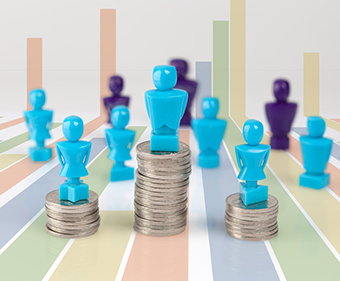New UTSA study delves into income inequality and inflation

(March 6, 2017) --A new study by Edgar Ghossoub, associate professor of economics at The University of Texas at San Antonio, posits that income inequality, in varying economies, can have substantial positive and negative effects for people in all walks of life depending on what kind of financial system they live under.
Income inequality became a wide public issue after the 2008 financial crisis, which was followed in later years by the Occupy movement. Protesters were especially frustrated with the massive gap in wealth between the millionaires and billionaires of Wall Street and the average American citizen.
"Typically, we have different income groups," Ghossoub said. "The low-income groups hold mainly assets like cash, which comes from their salaries, whereas the richer groups have more money to invest in many different assets."
Ghossoub studied financial systems all over the world to understand the relationship between income inequality and inflation, which is the rising or falling value of money. He found that as a system grows and develops, income inequality tends to rise because people are becoming wealthier while many are remaining poor. However, the size of the country's stock market is also a major factor.
"An economy with a large, active stock market leads to less income inequality compared to one with a smaller stock market," Ghossoub said. "A stock market promotes capital formation, which leads to higher wages and a healthier economy."
Still, the rich benefit from the strength of the stock market as the poor continue to rely solely on their own income, which could be significantly weakened with rising inflation, because their money is worth less. In countries like Mexico, with a smaller stock market but higher inflation, income inequality has a more damaging effect on the populace.
"Normally we associate income inequality with poverty," Ghossoub said. "There's always this feeling of unfairness. If you're rich, you have the resources to defend your interests, but the poor are left behind. If income inequality becomes a larger problem, it can lead to social unrest."
He notes, however, that as long as a nation's economy is moving forward, positive effects will follow.
"Central banks should focus on stabilizing prices to mitigate the effects of financial development on income inequality. When we have financial development, everyone is going to benefit," Ghossoub said. "Some people are always going to benefit more, but as the economy advances the welfare of everyone is going to rise."
-------------------------------
Read Edgar Ghossoub's study, "Financial Development, Income Inequality, and the Redistributive Effects of Monetary Policy."
Learn more about the UTSA Department of Economics.
Connect with UTSA online at Facebook, Twitter, YouTube, Instagram and LinkedIn.
Events
Move In To COLFA is strongly recommended for new students in COLFA. It gives you the chance to learn about the Student Success Center, campus resources and meet new friends!
Academic Classroom: Lecture Hall (MH 2.01.10,) McKinney Humanities BldgWe invite you to join us for Birds Up! Downtown, an exciting welcome back event designed to connect students with the different departments at the Downtown Campus. Students will have the opportunity to learn about some of the departments on campus, gain access to different resources, and collect some giveaways!
Bill Miller PlazaJoin us for an intimate evening of cocktails, conversation, and culinary inspiration with Pati Jinich, Emmy-nominated chef and James Beard Award-winning author. Enjoy light bites and signature drinks in the warm, modern setting of Mezquite as Pati connects with guests over her passion for Mexican cuisine and storytelling.
Mezquite Restaurant in Pullman Market, 221 Newell Ave., San Antonio 78215From inspired courses to thoughtful pairings and a rich sense of community, the Ven a Comer Signature Dinner is a night of shared meals, shared stories, and unforgettable flavor.
Stable Hall (Pear Brewery), 307 Pearl Pkwy, San Antonio 78215Come and celebrate this year's homecoming at the Downtown Campus with food, games, giveaways, music, and more. We look forward to seeing your Roadrunner Spirit!
Bill Miller Plaza

